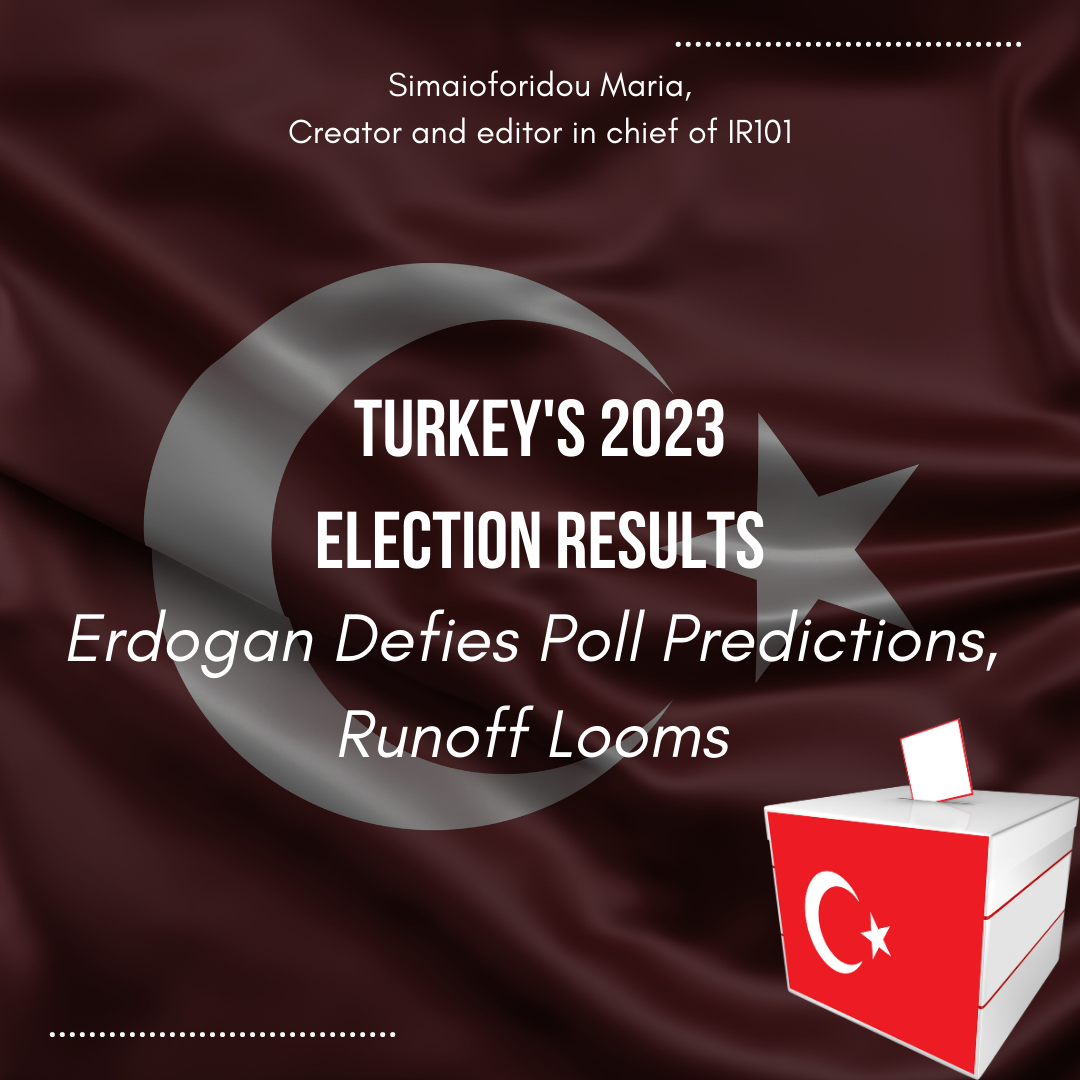Simaioforidou Maria, May 2023
In a surprising turn of events, Tayyip Erdogan has emerged as the winner in Turkey’s recent elections, catching many foreign analysts off guard. The Turkish president holds a clear advantage as he heads into the second round of elections with a five-point lead over his opponent, Kemal Kilicdaroglu. This unexpected outcome raises questions about the accuracy of the polls, which had predicted an opposition victory.
Initially, Erdogan claimed to have enough votes for a first-round win but expressed his willingness to accept a runoff. He accused unnamed individuals of attempting to deceive the nation by falsely claiming to be in the lead. On the other hand, Kilicdaroglu embraced the idea of a runoff and confidently declared his victory.
One major factor contributing to this surprising result is the lack of fairness and democratic practices during the elections. According to the state-owned Anadolu news agency, Erdogan received 49.24% of the votes, while Kilicdaroglu obtained 45.06%. However, discrepancies arose between the data released by state media and the Supreme Election Council (YSK), which oversees the election process. The Erdogan regime has control over the entire state apparatus, including the Supreme Election Commission, which created obstacles for the opposition in effectively campaigning. Most media outlets predominantly conveyed messages from the ruling coalition, further limiting the opposition’s reach.
The YSK reports that over 91% of the votes have been counted, but there have been delays in tallying overseas votes due to a higher number of overseas voters and the involvement of multiple parties this year. Kilicdaroglu and another candidate, Sinan Ogan, expressed concerns about the slow pace of vote counting. Kilicdaroglu criticized the blocking of some counts due to repeated objections and called for democracy workers to ensure that every vote is counted. Ogan alleged manipulation of overseas votes but provided no evidence to support the claims.
Additionally, the AKP has established itself as a dominant party with extensive networks of supporters within the country. Many voters rely on state allowances and benefits provided by the regime, making the prospect of losing significant financial support daunting for them. This poses a challenge for the opposition in swaying their votes.
Another reason for Erdogan’s victory lies in inappropriate interventions by foreign media and politicians. Expressing overt support for the opposition in a country where anti-Americanism, anti-Semitism, and Christianophobia sentiments prevail proved to be counterproductive. It is worth noting that Kilicdaroglu belongs to the Alevi religious minority, a group considered “less Turkish” by many conservative religious Muslims.
Despite the AKP’s decreased share of the parliamentary vote, marking its worst reported result in the past two decades, Erdogan remains a powerful force in Turkey’s political landscape. The outcome of the second round of voting will be critical in shaping the country’s future. It will not only determine its leadership but also influence its path concerning secularism, democracy, economic challenges, and international relations with various countries.
The election results carry significant implications for Turkey’s future, with potential effects on its relationship with Russia, the Middle East, and the West. The second round of voting will be closely watched as the candidates strive to secure the necessary support for victory. The outcome will not only impact Turkey but also resonate throughout the international community, affecting global dynamics and regional alliances.
If Erdogan wins the election, prospects for creative thinking and improved relations with the West will be limited. However, his economic challenges and changing parliamentary dynamics may moderate his actions. Relations with the United States and European countries will likely remain transactional and susceptible to crises.
In terms of the United States, the current relationship with Turkey is uninspiring due to issues such as U.S. sanctions, concerns about ties with Russia, and disagreements
References
Turkey election results 2023: what we know so far | Turkey | The Guardian. (n.d.). Retrieved May 15, 2023, from https://www.theguardian.com/world/2023/may/15/turkey-election-2023-results-live-election-result-polls-what-we-know-so-far
Turkey faces runoff election with Erdogan leading | Reuters. (n.d.). Retrieved May 15, 2023, from https://www.reuters.com/world/middle-east/turkey-votes-pivotal-elections-that-could-end-erdogans-20-year-rule-2023-05-13/
The Turkish Election Could Reset Ankara’s Relations With the West – Carnegie Endowment for International Peace. (n.d.). Retrieved May 15, 2023, from https://carnegieendowment.org/2023/05/09/turkish-election-could-reset-ankara-s-relations-with-west-pub-89715
Εκλογές στην Τουρκία: Γιατί νίκησε ο Ερντογάν | Η ΚΑΘΗΜΕΡΙΝΗ. (n.d.). Retrieved May 15, 2023, from https://www.kathimerini.gr/politics/562421047/ekloges-stin-toyrkia-giati-nikise-o-erntogan/
Turkish president votes in presidential, parliamentary elections. (n.d.). Retrieved May 15, 2023, from https://www.aa.com.tr/en/turkiye/turkish-president-votes-in-presidential-parliamentary-elections/2897010#

